金融英语作文 央行改革调查2018
关于中央银行的中英英语作文
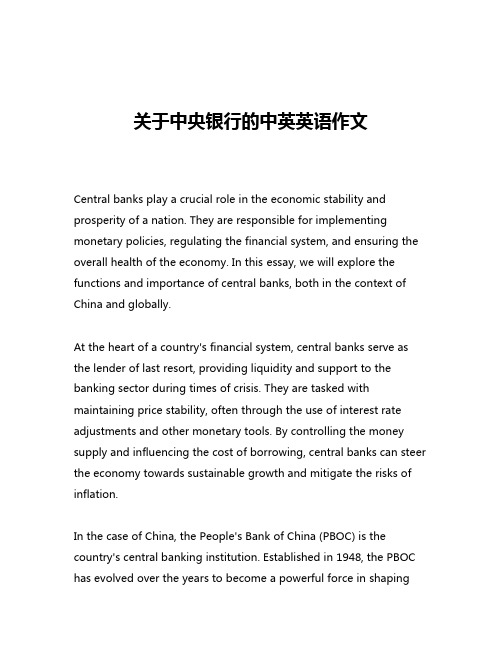
关于中央银行的中英英语作文Central banks play a crucial role in the economic stability and prosperity of a nation. They are responsible for implementing monetary policies, regulating the financial system, and ensuring the overall health of the economy. In this essay, we will explore the functions and importance of central banks, both in the context of China and globally.At the heart of a country's financial system, central banks serve as the lender of last resort, providing liquidity and support to the banking sector during times of crisis. They are tasked with maintaining price stability, often through the use of interest rate adjustments and other monetary tools. By controlling the money supply and influencing the cost of borrowing, central banks can steer the economy towards sustainable growth and mitigate the risks of inflation.In the case of China, the People's Bank of China (PBOC) is the country's central banking institution. Established in 1948, the PBOC has evolved over the years to become a powerful force in shapingChina's economic trajectory. Its primary objectives include promoting financial stability, supporting economic development, and safeguarding the value of the Chinese currency, the renminbi (RMB).One of the PBOC's key responsibilities is to manage the exchange rate of the RMB. By carefully monitoring and adjusting the currency's value, the central bank aims to maintain China's export competitiveness while also ensuring the stability of the domestic financial system. This delicate balance has been a subject of much international scrutiny, with some trading partners accusing China of currency manipulation to gain an unfair advantage in global trade.However, the PBOC's role extends far beyond exchange rate management. It also plays a crucial part in regulating the banking sector, setting reserve requirements, and overseeing the country's payment systems. The central bank's monetary policy decisions, such as adjusting interest rates and reserve requirements, can have a significant impact on the availability of credit, investment, and consumer spending within China.Globally, central banks are recognized as essential institutions for maintaining economic stability and promoting sustainable growth. The Federal Reserve (the Fed) in the United States, the European Central Bank (ECB), and the Bank of Japan (BOJ) are among the world's most influential central banking authorities, each with its ownunique set of challenges and policy considerations.The Fed, for instance, is tasked with achieving maximum employment and price stability in the United States. It does so by adjusting the federal funds rate, which is the interest rate at which banks lend to one another overnight. By raising or lowering this key rate, the Fed can influence the cost of borrowing for businesses and consumers, thereby affecting the pace of economic activity and inflation.Similarly, the ECB is responsible for maintaining price stability across the Eurozone, which comprises 19 of the 27 European Union member states. The ECB's monetary policy decisions, such as setting the benchmark interest rate and implementing asset purchase programs, have far-reaching implications for the economic well-being of the entire Eurozone.In Japan, the BOJ has struggled to overcome the persistent challenge of low inflation and sluggish economic growth. The central bank has employed a range of unconventional monetary policy tools, including negative interest rates and large-scale asset purchases, in an effort to stimulate the Japanese economy and achieve its 2% inflation target.Central banks around the world have also played a crucial role inresponding to global crises, such as the 2008 financial crisis and the COVID-19 pandemic. During these turbulent times, central banks have acted as the first line of defense, providing emergency liquidity, reducing interest rates, and implementing various asset purchase programs to support financial markets and the broader economy.In the case of the COVID-19 pandemic, central banks worldwide have taken unprecedented steps to mitigate the economic fallout. The Fed, for instance, has slashed interest rates to near-zero levels, launched a range of lending and asset purchase programs, and established currency swap lines with other central banks to ensure the smooth functioning of global financial markets.Similarly, the PBOC has implemented a series of monetary and fiscal measures to support the Chinese economy, including cutting interest rates, reducing reserve requirements for banks, and providing targeted lending to small and medium-sized enterprises. These actions have helped to cushion the economic impact of the pandemic and pave the way for a gradual recovery.Looking ahead, central banks will continue to play a pivotal role in shaping the economic landscape. As the world grapples with challenges such as climate change, technological disruption, and rising inequality, central banks will be called upon to adapt their policies and tools to address these complex issues.For instance, central banks are increasingly incorporating climate-related risks into their policy frameworks and exploring ways to support the transition to a low-carbon economy. The ECB, for example, has announced plans to incorporate climate change considerations into its monetary policy strategy, including the possibility of tilting its asset purchase programs towards greener investments.Moreover, central banks are also exploring the potential of digital currencies, both in the form of central bank digital currencies (CBDCs) and the integration of blockchain technology into their payment systems. These innovations could revolutionize the way money is created, distributed, and used, with far-reaching implications for financial inclusion, cross-border transactions, and the overall efficiency of the financial system.In conclusion, central banks play a pivotal role in shaping the economic landscape, both within individual countries and globally. By implementing monetary policies, regulating the financial system, and responding to crises, central banks strive to maintain price stability, foster economic growth, and ensure the overall health of the financial system. As the world continues to evolve, central banks will be called upon to adapt and innovate, ensuring that their policiesand tools remain relevant and effective in addressing the challenges of the 21st century.。
金融变革英语作文
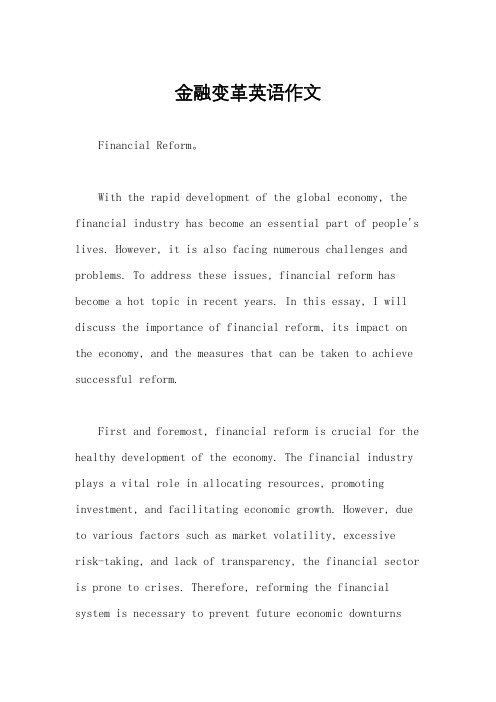
金融变革英语作文Financial Reform。
With the rapid development of the global economy, the financial industry has become an essential part of people's lives. However, it is also facing numerous challenges and problems. To address these issues, financial reform has become a hot topic in recent years. In this essay, I will discuss the importance of financial reform, its impact on the economy, and the measures that can be taken to achieve successful reform.First and foremost, financial reform is crucial for the healthy development of the economy. The financial industry plays a vital role in allocating resources, promoting investment, and facilitating economic growth. However, due to various factors such as market volatility, excessiverisk-taking, and lack of transparency, the financial sector is prone to crises. Therefore, reforming the financial system is necessary to prevent future economic downturnsand ensure stability.Furthermore, financial reform can enhance theefficiency and competitiveness of the economy. By promoting competition and innovation, financial reform can drive the development of new financial products and services, improve the efficiency of capital allocation, and reduce transaction costs. This, in turn, can stimulate investment and entrepreneurship, boost productivity, and foster economic growth.In addition, financial reform can address the issue of income inequality. The financial sector has been criticized for exacerbating income disparities, as it tends to benefit the wealthy more than the average person. Through reform, measures can be implemented to ensure fair access to financial services, promote financial inclusion, and reduce the wealth gap. This will contribute to a more equitable society and enhance social stability.To achieve successful financial reform, several measures need to be taken. Firstly, it is essential tostrengthen financial regulation and supervision. This involves setting up robust regulatory frameworks, enhancing risk management practices, and improving transparency and accountability in the financial industry. By doing so, the likelihood of financial crises can be minimized, andinvestor confidence can be restored.Secondly, promoting financial innovation is crucial. This can be achieved by encouraging the development of new financial technologies, such as blockchain and artificial intelligence, which can improve the efficiency, security, and accessibility of financial services. Additionally, fostering a culture of innovation within financial institutions and providing support for startups in the fintech sector can drive the transformation of the industry.Moreover, financial literacy should be promoted amongthe general public. Many individuals lack the necessary knowledge and skills to make informed financial decisions, which can lead to financial difficulties and vulnerability. By educating people about financial concepts, products, and risks, they can make better financial choices, improvetheir financial well-being, and contribute to a more stable financial system.In conclusion, financial reform is essential for the sustainable development of the economy. It can address issues such as financial instability, income inequality, and inefficient resource allocation. By implementing measures such as strengthening regulation, promoting innovation, and enhancing financial literacy, successful financial reform can be achieved. This will not onlybenefit the financial industry but also contribute to the overall prosperity and stability of society.。
关于金融的英语作文

关于金融的英语作文英文回答:As a finance professional, I have always been fascinated by the world of finance and the impact it has on our daily lives. Finance is a broad field that encompasses everything from personal budgeting to global economic trends. It plays a crucial role in shaping the way we live and the opportunities available to us.One of the most interesting aspects of finance is the concept of risk and return. In the investment world, we often hear the phrase "high risk, high return." This means that investments with the potential for high returns also come with a higher level of risk. On the other hand, investments with lower risk typically offer lower returns. This concept is fundamental to understanding the trade-offs involved in making financial decisions.For example, let's say I am considering investing in astart-up company. The potential for high returns is certainly appealing, but I also have to consider the high level of risk involved. The company may not succeed, and I could end up losing my investment. On the other hand, if I choose to invest in a stable, well-established company, the risk is lower, but so is the potential for high returns.It's a classic example of the risk-return trade-off in action.Another important aspect of finance is the role of interest rates. Interest rates have a significant impact on everything from the cost of borrowing money to the return on savings and investments. For example, when interest rates are low, it becomes cheaper to borrow money, which can stimulate spending and investment in the economy. On the other hand, low interest rates can also lead to lower returns on savings and investments, which can be a challenge for individuals looking to grow their wealth.In my own personal life, I have experienced the impact of interest rates on my mortgage. When interest rates were low, I was able to refinance my mortgage at a lower rate,which helped me save money on my monthly payments. This is just one example of how interest rates can have a direct impact on our financial well-being.Overall, finance is a fascinating and complex fieldthat has a profound impact on our lives. Whether it's understanding the trade-offs involved in investment decisions or navigating the impact of interest rates on our finances, there is always something new to learn andexplore in the world of finance.中文回答:作为一个金融专业人士,我一直对金融世界和它对我们日常生活的影响感到着迷。
你对金融业有什么看法英语作文
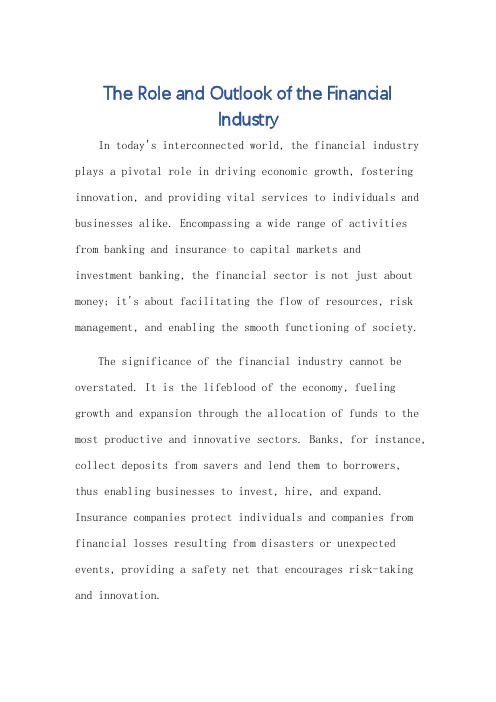
The Role and Outlook of the FinancialIndustryIn today's interconnected world, the financial industry plays a pivotal role in driving economic growth, fostering innovation, and providing vital services to individuals and businesses alike. Encompassing a wide range of activities from banking and insurance to capital markets andinvestment banking, the financial sector is not just about money; it's about facilitating the flow of resources, risk management, and enabling the smooth functioning of society. The significance of the financial industry cannot be overstated. It is the lifeblood of the economy, fueling growth and expansion through the allocation of funds to the most productive and innovative sectors. Banks, for instance, collect deposits from savers and lend them to borrowers, thus enabling businesses to invest, hire, and expand. Insurance companies protect individuals and companies from financial losses resulting from disasters or unexpected events, providing a safety net that encourages risk-taking and innovation.Capital markets, on the other hand, allow companies to raise funds by selling shares or bonds to investors, providing them with access to the capital they need to grow and expand. Investment banks advise companies on mergersand acquisitions, help them raise capital, and underwrite securities offerings, thus contributing to the efficiency and liquidity of the financial system.The financial industry is also a driver oftechnological innovation. The advent of digital banking, blockchain technology, and artificial intelligence has transformed the industry, making it more efficient, secure, and accessible to a wider range of people. These advancements have not only made financial services more convenient but have also opened up new avenues forfinancial inclusion, enabling those who were previously excluded from the financial system to access vital services. Looking ahead, the financial industry faces both challenges and opportunities. One of the key challenges is the evolving regulatory landscape. Governments andregulatory bodies are increasingly scrutinizing thefinancial industry, imposing tighter rules and regulationsto safeguard against financial crises and protect consumers. This regulatory scrutiny, while necessary, can also create compliance costs and operational complexities for financial institutions.Another challenge is the rise of new competitors and disruptors. Technology companies, for instance, are leveraging their data analytics and technology capabilities to offer financial services directly to consumers,bypassing traditional financial institutions. This disintermediation could pose a threat to incumbentfinancial institutions unless they themselves adapt and innovate to stay relevant and competitive.Despite these challenges, the financial industryremains a vibrant and dynamic sector with巨大的潜力巨大潜力和无数的机会。
全面深化改革英语作文
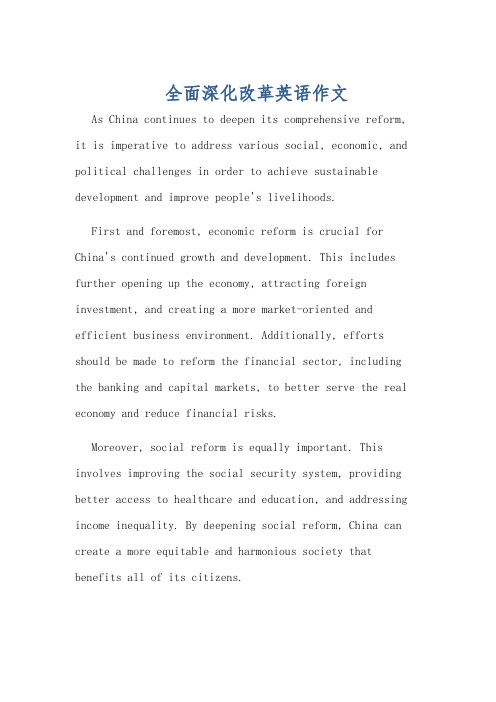
全面深化改革英语作文As China continues to deepen its comprehensive reform, it is imperative to address various social, economic, and political challenges in order to achieve sustainable development and improve people's livelihoods.First and foremost, economic reform is crucial for China's continued growth and development. This includes further opening up the economy, attracting foreign investment, and creating a more market-oriented and efficient business environment. Additionally, efforts should be made to reform the financial sector, including the banking and capital markets, to better serve the real economy and reduce financial risks.Moreover, social reform is equally important. This involves improving the social security system, providing better access to healthcare and education, and addressing income inequality. By deepening social reform, China can create a more equitable and harmonious society that benefits all of its citizens.Furthermore, political reform is essential for ensuring good governance and the rule of law. This includes strengthening the legal system, enhancing transparency and accountability, and promoting greater citizen participation in decision-making processes. By deepening political reform, China can build a more just and effective governance system that meets the needs and aspirations of its people.In conclusion, deepening comprehensive reform is vitalfor China's continued development and prosperity. By addressing economic, social, and political challenges,China can create a more dynamic and inclusive society that benefits all of its citizens.随着中国继续深化全面改革,解决各种社会、经济和政治挑战,实现可持续发展,改善人民生活水平变得至关重要。
金融政策 英语作文
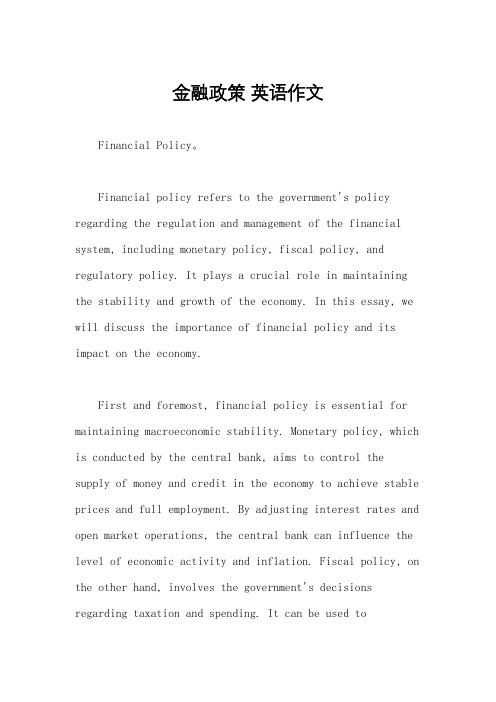
金融政策英语作文Financial Policy。
Financial policy refers to the government's policy regarding the regulation and management of the financial system, including monetary policy, fiscal policy, and regulatory policy. It plays a crucial role in maintaining the stability and growth of the economy. In this essay, we will discuss the importance of financial policy and its impact on the economy.First and foremost, financial policy is essential for maintaining macroeconomic stability. Monetary policy, which is conducted by the central bank, aims to control the supply of money and credit in the economy to achieve stable prices and full employment. By adjusting interest rates and open market operations, the central bank can influence the level of economic activity and inflation. Fiscal policy, on the other hand, involves the government's decisions regarding taxation and spending. It can be used tostimulate aggregate demand during a recession or to cool down an overheated economy. By managing the budget deficit and public debt, fiscal policy can contribute to the stability of the economy.Furthermore, financial policy is crucial for promoting long-term economic growth. By providing a stable and predictable environment for investment, financial policy can encourage capital accumulation and technological progress. For example, a sound regulatory framework can ensure the integrity of financial markets and protect investors, which is essential for attracting domestic and foreign investment. Moreover, a well-designed tax system can provide incentives for entrepreneurship and innovation, which are important drivers of economic growth. By promoting financial stability and efficiency, financial policy can contribute to the long-term prosperity of the economy.In addition, financial policy has a significant impact on income distribution and social equity. For example, tax policy can be used to redistribute income and reduceinequality. By imposing progressive taxes on high-income individuals and providing social welfare programs for the poor, the government can promote a more equal distribution of wealth. Moreover, financial regulation can prevent market abuses and protect consumers from predatory practices. By ensuring fair and transparent financial markets, financial policy can contribute to social justice and the well-being of the population.In conclusion, financial policy is a crucial tool for maintaining macroeconomic stability, promoting long-term economic growth, and achieving social equity. By implementing sound monetary, fiscal, and regulatory policies, the government can create a favorable environment for investment, innovation, and prosperity. Therefore, it is essential for policymakers to design and implement financial policies that are consistent with the objectives of economic stability, growth, and social justice.。
介绍中央银行英文作文
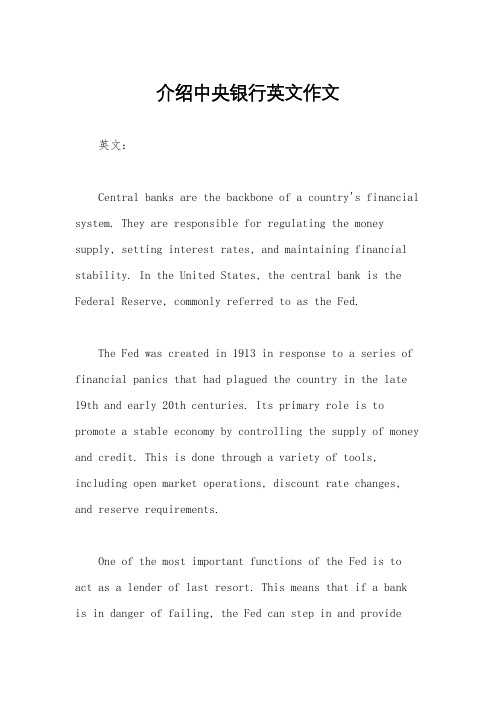
介绍中央银行英文作文英文:Central banks are the backbone of a country's financial system. They are responsible for regulating the money supply, setting interest rates, and maintaining financial stability. In the United States, the central bank is the Federal Reserve, commonly referred to as the Fed.The Fed was created in 1913 in response to a series of financial panics that had plagued the country in the late 19th and early 20th centuries. Its primary role is to promote a stable economy by controlling the supply of money and credit. This is done through a variety of tools, including open market operations, discount rate changes, and reserve requirements.One of the most important functions of the Fed is to act as a lender of last resort. This means that if a bankis in danger of failing, the Fed can step in and providethe necessary funds to keep it afloat. This is essentialfor maintaining financial stability and preventing widespread panic in the banking system.Another key role of the Fed is to regulate andsupervise banks and other financial institutions. This includes ensuring that they are operating in a safe and sound manner, and that they are complying with all relevant laws and regulations.Overall, the central bank plays a crucial role in the functioning of the economy. Without it, there would be no way to regulate the money supply, maintain financial stability, or provide a lender of last resort in times of crisis.中文:中央银行是一个国家金融体系的支柱。
金融保险-中国银行的改革英文版 精品
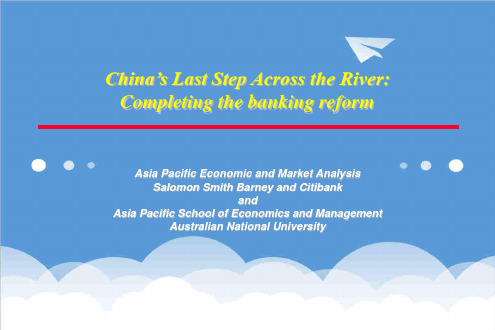
5
But bank fragility grew
➢ Banking problems caused by
Loss-making SOEs Policy loans (one-third of total outstanding loans) Weak banking institutions
The last-steps
➢ The past relatively pain-free reform approach is no longer
possible
➢ New reforms face tougher tasks:
giant SOEs pillar SOCBs
➢ Why adjustments may be painful?
4
Declining growth rates of household deposits
50 40 30 20 10
0
Sources: CEIC.
Mar-94 Jul-94 Nov-94 Mar-95 Jul-95 Nov-95 Mar-96 Jul-96 Nov-96 Mar-97 Jul-97 Nov-97 Mar-98 Jul-98 Nov-98 Mar-99 Jul-99 Nov-99 Mar-00
China 1978 1990 1999
பைடு நூலகம்
Indonesia
Japan
Singapore
US
0
20
40
60
80
100 120 140
Note: Numbers for the other economies are for 1998. Source: China Statistical Yearbook, various years; and International Financial Statistics, June 2000 issue.
中国经济的改革英语作文

中国经济的改革英语作文Title: Economic Reform in China。
China's economic reform, initiated in the late 1970s by Deng Xiaoping, has been a remarkable journey marked by significant changes and achievements. This reform has transformed China from a centrally planned economy to a more market-oriented one, leading to unprecedented growth and development. In this essay, we will delve into the key aspects of China's economic reform and its impact.First and foremost, one of the pivotal strategies of China's economic reform has been the opening up of its economy to foreign investment and trade. This wasfacilitated by establishing Special Economic Zones (SEZs)in coastal regions, offering preferential policies to attract foreign capital and technology. As a result, China became a global manufacturing hub and a major player in international trade, significantly boosting its GDP and lifting millions out of poverty.Another crucial aspect of China's economic reform isthe restructuring of state-owned enterprises (SOEs). Initially, SOEs dominated the economy, but theirinefficiency and lack of competitiveness became evident. Reform measures such as corporatization, privatization, and introducing market mechanisms were implemented to improve their performance and promote healthy competition. Whilethis process faced challenges and criticisms, it led to increased efficiency, innovation, and productivity in the long run.Furthermore, financial reform has played a vital rolein China's economic transformation. The establishment of a modern banking system, stock exchanges, and regulatory frameworks has facilitated capital mobilization, allocation, and risk management. Moreover, the internationalization of the Chinese currency, the Renminbi (RMB), has enhancedChina's role in global finance and trade, fostering its integration into the world economy.Moreover, China's economic reform has prioritized ruraldevelopment and poverty alleviation. Agricultural reforms such as the Household Responsibility System empowered farmers with land rights and incentivized productivity, leading to a surge in agricultural output and rural incomes. Additionally, targeted poverty alleviation programs have been instrumental in improving living standards and narrowing the urban-rural income gap.In addition to economic reforms, China has also pursued environmental sustainability as a key objective. Recognizing the adverse impact of rapid industrializationon the environment, the government has implementedstringent environmental regulations, promoted green technologies, and invested in renewable energy sources. While challenges persist, these efforts signify China's commitment to achieving balanced and sustainable development.Looking ahead, China faces new challenges and opportunities in sustaining its economic reform agenda. Structural reforms, including further opening up of markets, addressing income inequality, and enhancing innovation andtechnological capabilities, will be crucial. Moreover, navigating external pressures such as trade tensions and geopolitical uncertainties requires adept policymaking and strategic foresight.In conclusion, China's economic reform has been a transformative journey that has propelled its rapid development and global significance. By embracing market-oriented policies, opening up to the world, and undertaking structural reforms, China has achieved remarkable economic growth and improved the well-being of its people. As China continues on its path of reform and opening up, it remains a key driver of global economic progress and a model for other developing nations.。
关于金融的英文小作文

关于金融的英文小作文英文:Finance is a vast and intricate field that plays a crucial role in both individuals' lives and the global economy. From personal finance management to corporate investments, the principles and practices in finance are diverse and dynamic.Let's delve into personal finance first. It's all about managing your own money wisely. Think about it as if you were the CEO of your own financial life. You have income streams, expenses, investments, and savings goals to consider. Budgeting is like setting up your company's financial plan – you allocate resources to different departments (expenses), invest in growth opportunities (investments), and keep a reserve for emergencies (savings). For example, imagine you have a side hustle selling handmade crafts. You earn some extra cash, and you're torn between splurging on a new gadget or investing it back intoyour business. Decisions, decisions!Now, let's shift gears to corporate finance. Here, companies navigate a complex landscape of investments, financing, and risk management. Picture yourself as the CFO of a multinational corporation. Your job involves making strategic financial decisions that maximize shareholder value while mitigating risks. You might explore avenueslike issuing bonds to raise capital for expansion, evaluating mergers and acquisitions for growth opportunities, or hedging against currency fluctuations to protect profits. It's like playing a high-stakes game of chess with the company's finances – every move counts. For instance, consider a tech company deciding whether to acquire a smaller startup to bolster its innovation capabilities. It's not just about crunching numbers; it's about predicting market trends and staying ahead of the competition.Now, let's switch to Chinese for a moment.中文:金融是一个广阔而复杂的领域,在个人生活和全球经济中都发挥着至关重要的作用。
金融方面的英文作文
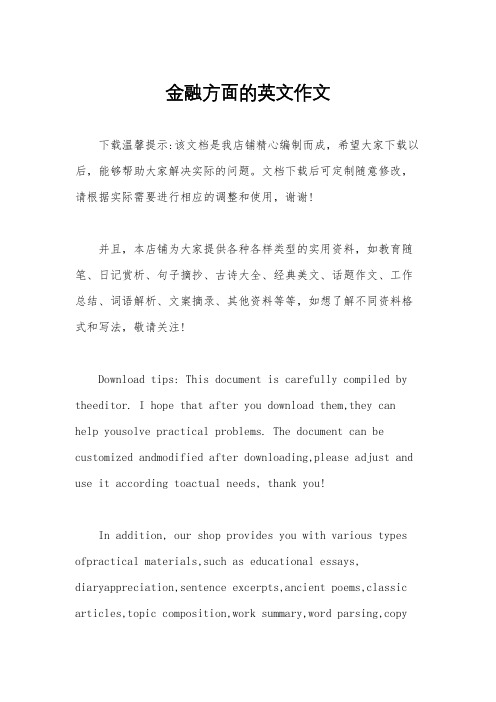
金融方面的英文作文下载温馨提示:该文档是我店铺精心编制而成,希望大家下载以后,能够帮助大家解决实际的问题。
文档下载后可定制随意修改,请根据实际需要进行相应的调整和使用,谢谢!并且,本店铺为大家提供各种各样类型的实用资料,如教育随笔、日记赏析、句子摘抄、古诗大全、经典美文、话题作文、工作总结、词语解析、文案摘录、其他资料等等,如想了解不同资料格式和写法,敬请关注!Download tips: This document is carefully compiled by theeditor. I hope that after you download them,they can help yousolve practical problems. The document can be customized andmodified after downloading,please adjust and use it according toactual needs, thank you!In addition, our shop provides you with various types ofpractical materials,such as educational essays, diaryappreciation,sentence excerpts,ancient poems,classic articles,topic composition,work summary,word parsing,copyexcerpts,other materials and so on,want to know different data formats andwriting methods,please pay attention!I really like investing in stocks. It's so exciting to see the prices go up and down. You never know what's gonna happen next.Banks play a crucial role in our financial lives. They help us manage our money and provide various services.Credit cards can be handy, but you gotta be careful not to overspend and get into debt.The foreign exchange market is huge and complex. It takes a lot of knowledge and skills to navigate it.Personal finance is something everyone should pay attention to. It's about making smart decisions with your money.。
对金融机构的看法英语作文
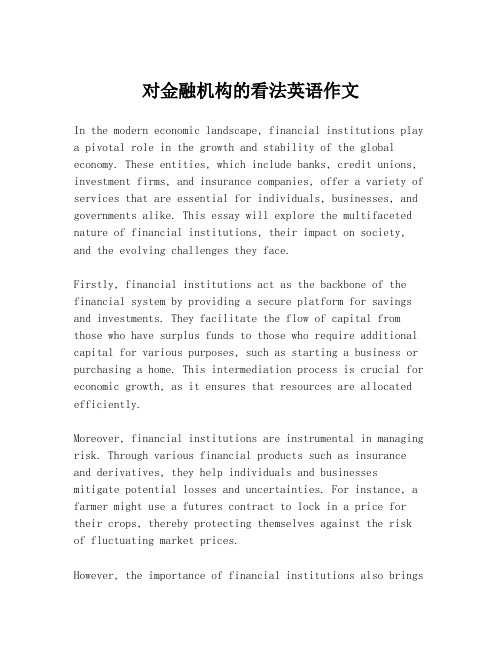
对金融机构的看法英语作文In the modern economic landscape, financial institutions play a pivotal role in the growth and stability of the global economy. These entities, which include banks, credit unions, investment firms, and insurance companies, offer a variety of services that are essential for individuals, businesses, and governments alike. This essay will explore the multifaceted nature of financial institutions, their impact on society, and the evolving challenges they face.Firstly, financial institutions act as the backbone of the financial system by providing a secure platform for savings and investments. They facilitate the flow of capital from those who have surplus funds to those who require additional capital for various purposes, such as starting a business or purchasing a home. This intermediation process is crucial for economic growth, as it ensures that resources are allocated efficiently.Moreover, financial institutions are instrumental in managing risk. Through various financial products such as insurance and derivatives, they help individuals and businessesmitigate potential losses and uncertainties. For instance, a farmer might use a futures contract to lock in a price for their crops, thereby protecting themselves against the risk of fluctuating market prices.However, the importance of financial institutions also bringswith it a set of challenges. One of the most significant isthe potential for systemic risk, which refers to thepossibility that the failure of one financial institutioncould trigger a chain reaction, leading to the collapse of others and potentially causing a financial crisis. The 2008 global financial crisis is a stark reminder of thedevastating consequences that can arise from the failure to manage systemic risk effectively.Another challenge is the issue of financial inclusion. While financial institutions have become increasingly sophisticated, there remains a significant portion of the global population that lacks access to basic financial services. This can exacerbate economic inequality and hinder social mobility, as those without access to financial services are often unableto save, invest, or borrow at reasonable terms.Additionally, the advent of technology has led to a rapid transformation in the financial industry. Fintech companiesare disrupting traditional financial services with innovative solutions such as mobile banking, peer-to-peer lending, and digital currencies. While these developments offer numerous benefits, including increased convenience and lower costs,they also pose regulatory challenges and raise concerns about data security and privacy.In conclusion, financial institutions are indispensable tothe functioning of the modern economy. They provide essential services that enable economic growth, manage risk, andfacilitate financial transactions. However, they also face significant challenges, including systemic risk, financialexclusion, and the impact of technological innovation. As we move forward, it is imperative that these institutions adapt to the changing landscape while ensuring that they continue to serve the needs of society and maintain the trust of their customers.。
金融对中国很重要英文作文
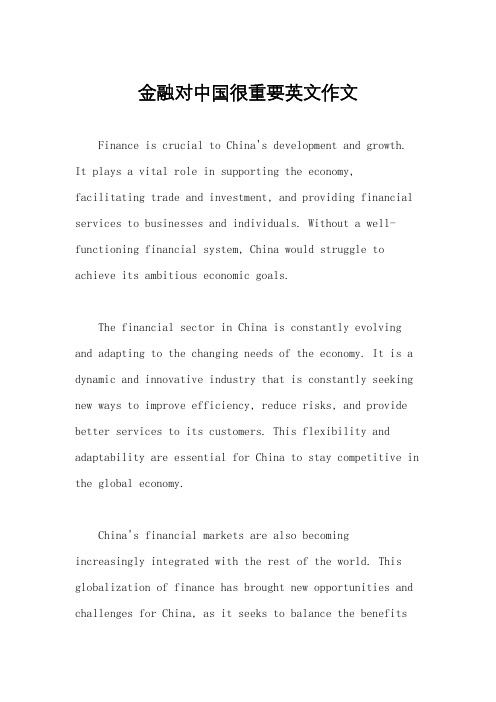
金融对中国很重要英文作文Finance is crucial to China's development and growth. It plays a vital role in supporting the economy,facilitating trade and investment, and providing financial services to businesses and individuals. Without a well-functioning financial system, China would struggle to achieve its ambitious economic goals.The financial sector in China is constantly evolving and adapting to the changing needs of the economy. It is a dynamic and innovative industry that is constantly seeking new ways to improve efficiency, reduce risks, and provide better services to its customers. This flexibility and adaptability are essential for China to stay competitive in the global economy.China's financial markets are also becomingincreasingly integrated with the rest of the world. This globalization of finance has brought new opportunities and challenges for China, as it seeks to balance the benefitsof international cooperation with the need to maintain financial stability and control over its own economy.The Chinese government plays a crucial role in shaping the country's financial sector. It sets the regulatory framework, provides oversight and supervision, and intervenes in the market when necessary to maintain stability and prevent systemic risks. This strong government involvement has helped China navigate through various financial crises and challenges over the years.In conclusion, finance is a cornerstone of China's economy, and its importance cannot be overstated. The financial sector is a key driver of economic growth, a facilitator of international trade and investment, and a provider of essential services to businesses and individuals. As China continues to develop and modernize, its financial sector will play an increasingly important role in shaping the country's future.。
金融政策英语作文
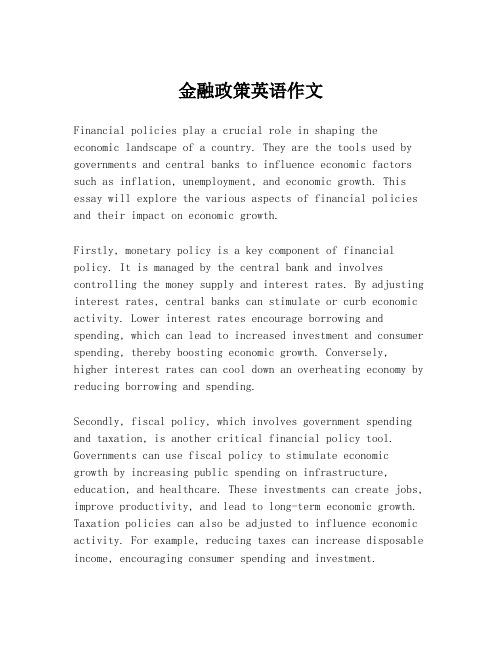
金融政策英语作文Financial policies play a crucial role in shaping the economic landscape of a country. They are the tools used by governments and central banks to influence economic factors such as inflation, unemployment, and economic growth. This essay will explore the various aspects of financial policies and their impact on economic growth.Firstly, monetary policy is a key component of financial policy. It is managed by the central bank and involves controlling the money supply and interest rates. By adjusting interest rates, central banks can stimulate or curb economic activity. Lower interest rates encourage borrowing and spending, which can lead to increased investment and consumer spending, thereby boosting economic growth. Conversely, higher interest rates can cool down an overheating economy by reducing borrowing and spending.Secondly, fiscal policy, which involves government spending and taxation, is another critical financial policy tool. Governments can use fiscal policy to stimulate economic growth by increasing public spending on infrastructure, education, and healthcare. These investments can create jobs, improve productivity, and lead to long-term economic growth. Taxation policies can also be adjusted to influence economic activity. For example, reducing taxes can increase disposable income, encouraging consumer spending and investment.Thirdly, regulatory policies are also part of the financial policy framework. These include laws and regulations that govern financial institutions and markets. Regulatorypolicies aim to maintain financial stability and prevent crises that could lead to economic downturns. By ensuring the stability of the financial system, regulatory policies indirectly contribute to economic growth by creating a safe environment for investment and business operations.Moreover, international financial policies, such as trade tariffs and currency valuation, can also impact a country's economic growth. Policies that promote free trade and fair currency valuation can lead to increased international trade, which can stimulate economic growth by opening up new markets for domestic producers.However, it is important to note that financial policies must be carefully balanced. Overly expansionary policies can lead to inflation, while overly restrictive policies can slow down economic growth. Therefore, policymakers must consider the current state of the economy and the potential long-term effects of their decisions.In conclusion, financial policies are a powerful tool for influencing economic growth. Through monetary policy, fiscal policy, regulatory policies, and international financial policies, governments and central banks can shape the economic environment to promote growth and stability. Understanding the nuances of these policies and their interplay is essential for anyone studying economics orlooking to understand the forces that drive economic development.。
金融行业作文模板英文

金融行业作文模板英文The financial industry is an ever-changing and dynamic field that plays a crucial role in the global economy. It encompasses a wide range of activities, including banking, investment, insurance, and more. This industry is constantly evolving to meet the needs of businesses and individuals, and it requires a deep understanding of economic trends and market forces.Financial institutions, such as banks and investment firms, are responsible for managing and investing money on behalf of their clients. They provide essential services, such as loans, mortgages, and investment opportunities, that help businesses and individuals achieve their financial goals. These institutions must navigate complex regulations and market conditions to ensure the safety and security of their clients' assets.Risk management is a key aspect of the financial industry, as it involves identifying, assessing, andmitigating potential risks that could impact an organization's financial well-being. This includes market risk, credit risk, and operational risk, among others. Effective risk management is essential for ensuring the stability and longevity of financial institutions.The financial industry is heavily reliant on technology to streamline operations, improve efficiency, and enhance security. Fintech, or financial technology, has revolutionized the way financial services are delivered, making it easier for individuals and businesses to access banking, investment, and insurance products. However, this reliance on technology also introduces new challenges, such as cybersecurity threats and data privacy concerns.Globalization has had a significant impact on the financial industry, as it has created new opportunities for investment and expansion. Financial institutions must navigate the complexities of international markets, exchange rates, and regulatory environments to effectively operate on a global scale. This requires a deep understanding of cross-border transactions and the abilityto adapt to diverse cultural and economic contexts.Overall, the financial industry is a multifaceted and complex field that requires a diverse set of skills and expertise. It plays a critical role in driving economic growth and development, and it is essential for individuals and businesses to have access to reliable and secure financial services. As the industry continues to evolve, it will be important for financial professionals to stay informed about emerging trends and developments to effectively navigate the challenges and opportunities that lie ahead.。
以金融为主题的英语作文
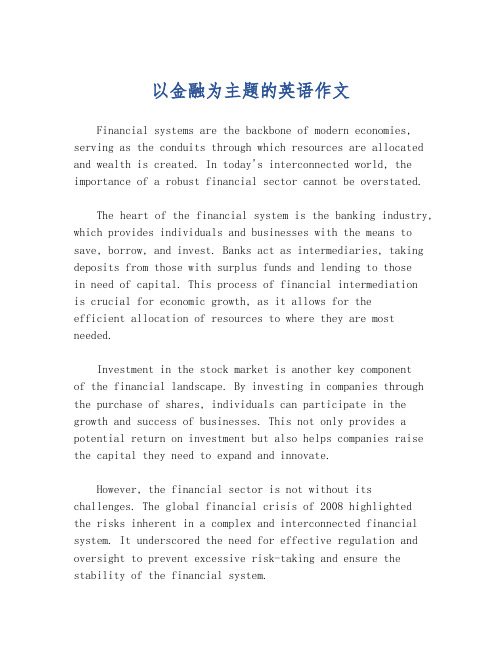
以金融为主题的英语作文Financial systems are the backbone of modern economies, serving as the conduits through which resources are allocated and wealth is created. In today's interconnected world, the importance of a robust financial sector cannot be overstated.The heart of the financial system is the banking industry, which provides individuals and businesses with the means to save, borrow, and invest. Banks act as intermediaries, taking deposits from those with surplus funds and lending to thosein need of capital. This process of financial intermediationis crucial for economic growth, as it allows for theefficient allocation of resources to where they are most needed.Investment in the stock market is another key componentof the financial landscape. By investing in companies through the purchase of shares, individuals can participate in the growth and success of businesses. This not only provides a potential return on investment but also helps companies raise the capital they need to expand and innovate.However, the financial sector is not without its challenges. The global financial crisis of 2008 highlightedthe risks inherent in a complex and interconnected financial system. It underscored the need for effective regulation and oversight to prevent excessive risk-taking and ensure the stability of the financial system.Moreover, the advent of digital currencies and blockchain technology has introduced new dimensions to the financial world. These innovations have the potential to revolutionize the way we think about money and transactions, offering increased efficiency and security.In conclusion, the financial sector is a critical part of our economy, with a profound impact on the lives of individuals and the health of nations. As we move forward, it is essential that we continue to innovate and adapt, while also ensuring that the system remains stable and fair for all participants.。
有关金融的英语作文300字
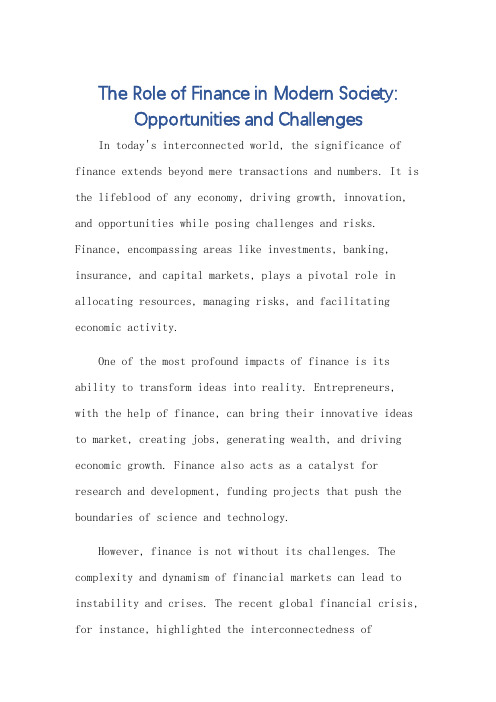
The Role of Finance in Modern Society: Opportunities and ChallengesIn today's interconnected world, the significance of finance extends beyond mere transactions and numbers. It is the lifeblood of any economy, driving growth, innovation, and opportunities while posing challenges and risks. Finance, encompassing areas like investments, banking, insurance, and capital markets, plays a pivotal role in allocating resources, managing risks, and facilitating economic activity.One of the most profound impacts of finance is its ability to transform ideas into reality. Entrepreneurs, with the help of finance, can bring their innovative ideas to market, creating jobs, generating wealth, and driving economic growth. Finance also acts as a catalyst for research and development, funding projects that push the boundaries of science and technology.However, finance is not without its challenges. The complexity and dynamism of financial markets can lead to instability and crises. The recent global financial crisis, for instance, highlighted the interconnectedness offinancial markets and the potential for contagion when one part of the system fails. This underscores the need for robust financial regulations and sound risk management practices.Moreover, finance can create and perpetuate inequality. The concentration of wealth and power in the hands of a few can lead to economic disparities that erode social cohesion and stability. Finance, therefore, needs to be inclusive, ensuring that it benefits a wide section of society, not just the privileged few.In conclusion, finance is a double-edged sword. It offers unprecedented opportunities for growth, innovation, and progress but also poses significant risks and challenges. It is, therefore, crucial that we harness the power of finance responsibly, ensuring that it serves the interests of society at large, not just narrow sectional interests.**金融在现代社会中的作用:机遇与挑战**在当今这个紧密相连的世界中,金融的重要性远不止于交易和数字。
金融方面的英文作文
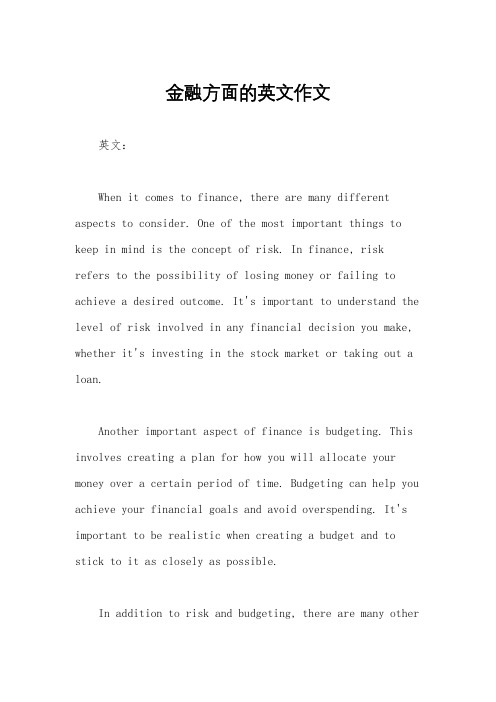
金融方面的英文作文英文:When it comes to finance, there are many different aspects to consider. One of the most important things to keep in mind is the concept of risk. In finance, riskrefers to the possibility of losing money or failing to achieve a desired outcome. It's important to understand the level of risk involved in any financial decision you make, whether it's investing in the stock market or taking out a loan.Another important aspect of finance is budgeting. This involves creating a plan for how you will allocate your money over a certain period of time. Budgeting can help you achieve your financial goals and avoid overspending. It's important to be realistic when creating a budget and to stick to it as closely as possible.In addition to risk and budgeting, there are many otherimportant concepts to understand in finance. These include interest rates, credit scores, and taxes. Understanding these concepts can help you make informed financial decisions and avoid costly mistakes.中文:在金融领域,有很多不同的方面需要考虑。
国企改革英文作文
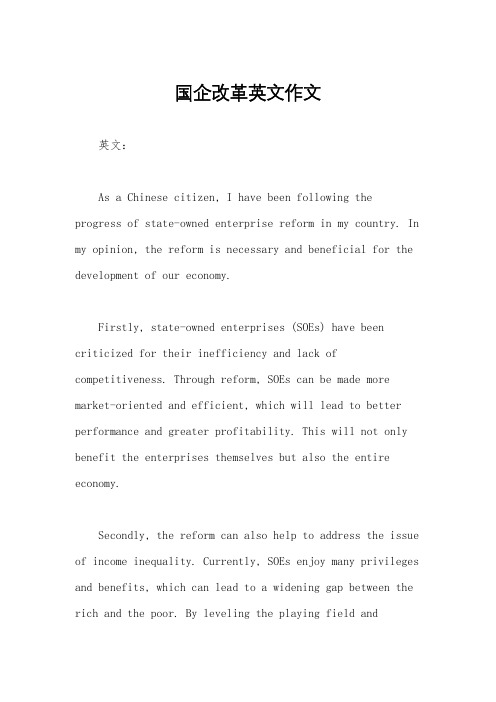
国企改革英文作文英文:As a Chinese citizen, I have been following the progress of state-owned enterprise reform in my country. In my opinion, the reform is necessary and beneficial for the development of our economy.Firstly, state-owned enterprises (SOEs) have been criticized for their inefficiency and lack of competitiveness. Through reform, SOEs can be made more market-oriented and efficient, which will lead to better performance and greater profitability. This will not only benefit the enterprises themselves but also the entire economy.Secondly, the reform can also help to address the issue of income inequality. Currently, SOEs enjoy many privileges and benefits, which can lead to a widening gap between the rich and the poor. By leveling the playing field andopening up competition, the reform can ensure that everyone has an equal opportunity to succeed.Furthermore, the reform can also attract more foreign investment and improve China's international competitiveness. By allowing private enterprises to compete with SOEs on a level playing field, foreign investors will be more likely to invest in China. This will not only bring in more capital but also help to transfer advanced technology and management expertise to Chinese enterprises.In conclusion, state-owned enterprise reform is a necessary step for China's economic development. By making SOEs more market-oriented and efficient, addressing income inequality, and attracting more foreign investment, the reform can help to ensure the long-term sustainability and competitiveness of our economy.中文:作为一名中国公民,我一直关注着我国国企改革的进展。
央行 流动性 小作文
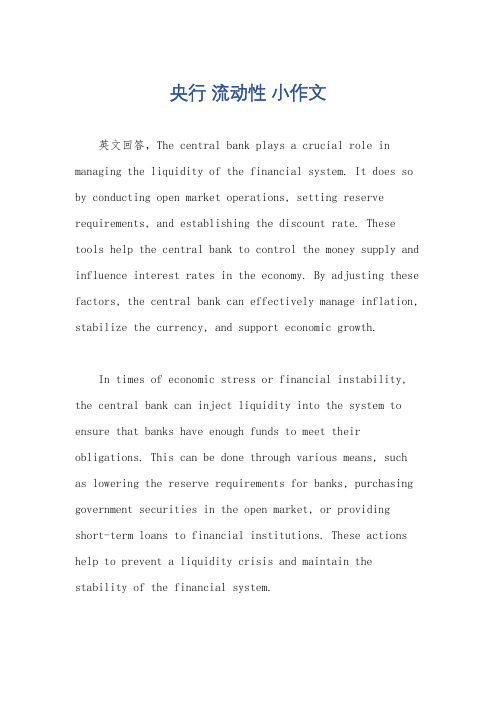
央行流动性小作文英文回答,The central bank plays a crucial role in managing the liquidity of the financial system. It does so by conducting open market operations, setting reserve requirements, and establishing the discount rate. These tools help the central bank to control the money supply and influence interest rates in the economy. By adjusting these factors, the central bank can effectively manage inflation, stabilize the currency, and support economic growth.In times of economic stress or financial instability, the central bank can inject liquidity into the system to ensure that banks have enough funds to meet their obligations. This can be done through various means, such as lowering the reserve requirements for banks, purchasing government securities in the open market, or providing short-term loans to financial institutions. These actions help to prevent a liquidity crisis and maintain thestability of the financial system.On the other hand, excessive liquidity in the financial system can lead to inflation and asset bubbles. In such cases, the central bank may use tools to withdraw liquidity from the system, such as increasing reserve requirementsfor banks, selling government securities in the open market, or raising the discount rate. These measures help to curb inflation and prevent the economy from overheating.In summary, the central bank plays a critical role in managing the liquidity of the financial system. By using various tools and instruments, it can ensure that there is enough liquidity to support economic activity while also preventing excessive liquidity that can lead to inflation and financial instability.中文回答,央行在管理金融体系的流动性方面扮演着至关重要的角色。
- 1、下载文档前请自行甄别文档内容的完整性,平台不提供额外的编辑、内容补充、找答案等附加服务。
- 2、"仅部分预览"的文档,不可在线预览部分如存在完整性等问题,可反馈申请退款(可完整预览的文档不适用该条件!)。
- 3、如文档侵犯您的权益,请联系客服反馈,我们会尽快为您处理(人工客服工作时间:9:00-18:30)。
①The key to reform of Chinese foreign exchange system is to realize the marketization of exchange rate. Xiao Lisheng, deputy director of the International finical research institute of the Chinese academy of social science, has recently studied the latest the foreign exchange system reform in china.
②Exchange rate marketization reform, I think, by doing a research, can be divided into three steps: the first step, introduce multi-level market trading body. At present, the foreign exchange market implements the principle of real demand, and china, as a big country, has strong export trade and strong homogeneity(均匀性)in foreign exchange trading, and the exchange rate pricing will produce a large deviation. Under such circumstances(条件), it is entirely dependent on traders to become the main body of the foreign exchange market, which will have certain constraints(限制)on the development of the foreign exchange market. The second step is to try not to interfere in the exchange rate and let the market decide the price of the RMB.When market participants slowly adjust to exchange rate fluctuations(波动), they will spontaneously(自发地)generate exchange rate hedging(汇率套期保值)and hedging financial instruments(对冲金融工具). The third step is to gradually liberalize capital account and introduce overseas investors on the basis of above.
③T hrough the coordination and mutual compensation(互补)of these arrangements, Chinese foreign exchange market will become a truly market-oriented market, and exchange rate will really form a market-oriented exchange rate.
中文意思:
中国外汇体制改革的关键是实现汇率市场化。
中国社会科学院世界经济与政治研究所国际金融研究所副所长萧丽胜最近研究了中国最新的外汇体制改革。
汇率市场化需要尽可能减少干预,在外汇市场引入各种交易主体。
在汇率未被市场化之前,汇率的优势在于可以保持出口顺畅,汇率稳定,从而降低了经济的边际风险,而外部冲击不能很快地传导到国家。
然而,缺乏灵活的汇率机制会导致外汇市场的不平衡,实际上,这也是一个累积风险。
因此,要避免外汇市场的动荡,就必须释放外汇市场积累的不平衡压力,而不是等待出现压力溃坝的问题。
我认为,汇率市场化改革可以分为三个步骤:第一步,引入多层次市场交易主体。
目前,外汇市场实行实际需求的原则,我国作为一个大国,在出口贸易中具有较强的出口贸易和较强的同质化,汇率的定价会产生较大的偏差。
在这种情况下,完全依赖交易者成为外汇市场主体,对外汇市场的发展有一定的制约,因此,外汇市场改革的第一步需要一定的程度。
放宽实际需求规则,引入多层次市场交易者,并引入基金和证券交易商作为外汇市场中的交易者和做市商。
第二步是尽量不干预汇率,让市场决定人民币的价格,当市场参与者慢慢调整汇率波动时,就会自发地产生汇率对冲和套期保值金融工具。
第三步是在上述基础上逐步放开资本账户,引进境外投资者。
目前,资本账户管理更加严格,外汇市场的基础设施可以首先建立,汇率将放开,干预可以减少。
最后,资本账户开放。
通过这些安排的协调和相互补偿,中国外汇市场将成为真正面向市场的市场,汇率将真正形成市场化的汇率。
